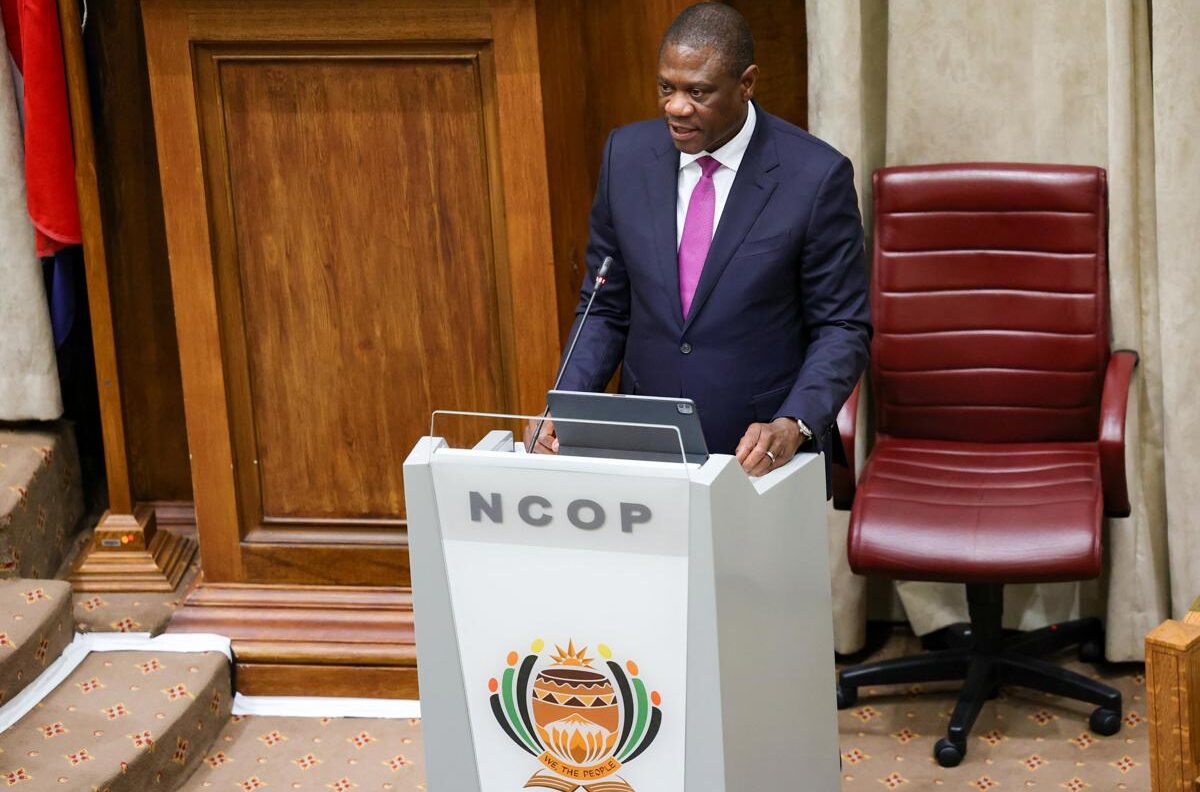Is Paul Mashatile losing patience with failing municipalities? Inside his explosive warning over SA’s water crisis & debt chaos

Deputy President Paul Mashatile answered questions in the NCOP in Parliament, Cape Town on 25 November 2025. Image Credit: @PMashatile/X
Deputy President Paul Mashatile has issued a stern warning to struggling municipalities as South Africa battles a worsening water crisis and mounting municipal debt, insisting that failing local governments can no longer rely on bailouts or expect debt write-offs to become standard practice.
Mashatile, addressing the National Council of Provinces (NCOP) this week, placed the country’s escalating water-supply failures squarely on corruption, collapsing infrastructure, mismanagement, and criminal networks linked to water-tanker operations. His remarks highlight growing national alarm over deteriorating basic services in dozens of municipalities.
Municipal Failures Driving the Water Crisis, Says Mashatile
Responding to questions from NCOP members, Mashatile acknowledged that millions of residents are facing “an ongoing water-supply crisis” due to systemic failures in local government.
He said multiple municipalities have lost the capacity to reliably provide water and sanitation services, with the Department of Water and Sanitation reporting a national reliability decline to 68% and water quality deterioration in approximately 60% of supply systems.
Communities across the country have endured years of persistent water shortages, often taking to the streets in protest as infrastructure continues to collapse with little visible improvement.
READ ALSO
Corruption, Poor Governance and Criminal Networks Blamed
Mashatile outlined a combination of entrenched issues driving the crisis, including:
- Poor governance and inadequate administrative capacity
- Insufficient infrastructure investment
- Failure to maintain existing water systems
- Corruption linked to tanker operators
- Financial mismanagement
He emphasised that criminal syndicates are profiting from artificial shortages through water-tanker operations, and confirmed that National Treasury has warned municipalities against long-term reliance on tankers, which should only serve as emergency solutions.
Government Launches Water Task Team and Public–Private Partnership Initiatives
In an effort to stabilise the sector, Mashatile highlighted interventions such as:
- A dedicated Water Task Team to tackle security, infrastructure and project bottlenecks
- Outcomes from the Water and Sanitation Indaba, including boosting investment and sustainability
- The establishment of a Water Partnership Office within the DBSA to prepare large-scale private-sector projects
- Key PPPs, such as the Olifants River Management Model Programme, addressing Limpopo’s bulk water needs through a 50-50 funding structure between government and mining companies
Over the next three years, the Department of Water and Sanitation aims to expand PPPs and blended-financing models to deliver more reliable water access.
Debt Write-Offs “Won’t Be the Norm”, Mashatile Warns Struggling Municipalities
In a separate NCOP engagement, Mashatile addressed the soaring municipal debt owed to Eskom and water boards, now amounting to billions of rands, stressing that Treasury will not continue granting debt relief to municipalities that fail to meet financial management requirements.
“We are not going to keep debt relief forever. Eskom and water boards need those resources to expand services,” he said.
Treasury has already begun withholding equitable share transfers from defaulting municipalities and redirecting funds directly to suppliers.
Mashatile also hinted at potential mergers of non-viable municipalities lacking revenue bases, arguing that long-term sustainability requires structural change.
Call for Community Participation and Whistleblowing
Mashatile urged communities to play a more active role in protecting critical infrastructure, reporting misconduct and confronting corruption in the water sector.
“As the government, we call for increased community participation… and a culture of whistleblowing to expose criminal networks,” he said.
FAQ
1. What did Paul Mashatile say about South Africa’s water crisis?
Mashatile said the water crisis is driven by corruption, poor governance, collapsing infrastructure and criminal activity linked to water-tanker operations. He warned that many municipalities no longer have the capacity to deliver reliable water services.
2. Why are South African municipalities failing to supply water?
According to Mashatile, the failures stem from inadequate infrastructure investment, poor maintenance, financial mismanagement, lack of technical expertise, and widespread corruption.
3. Are municipalities going to get more debt write-offs?
Mashatile made it clear that debt write-offs will not be the norm. Municipalities that fail to manage their finances will not be eligible for future bailouts.
4. How much debt do municipalities owe Eskom and water boards?
Municipalities collectively owe billions of rands in unpaid debt, forcing Treasury to withhold transfers and redirect funds to service providers.
5. What is the government doing to fix the water crisis?
Government interventions include the Water Task Team, infrastructure reforms, PPP investments through the Water Partnership Office, and targeted projects like the Olifants River Management Model.
6. Will municipalities be merged?
Mashatile said merging non-viable municipalities is a long-term possibility to improve sustainability, especially where revenue bases are too weak to support service delivery.
7. What role will public-private partnerships play?
PPPs are central to restoring infrastructure capacity. They help fund major water projects, improve project management and introduce private-sector efficiency.
8. Why is tanker corruption such a big issue?
Criminal networks allegedly manipulate supply failures to profit from emergency water-tanker contracts, draining municipal budgets and preventing long-term solutions.
9. How can communities help fight corruption in the water sector?
Mashatile urged communities to report sabotage, protect infrastructure, and embrace whistleblowing to expose corruption and criminal operations.

